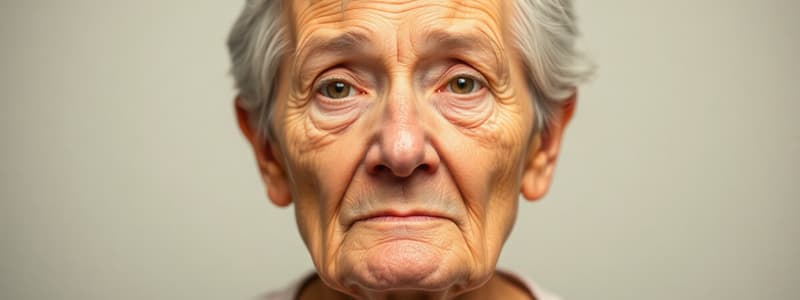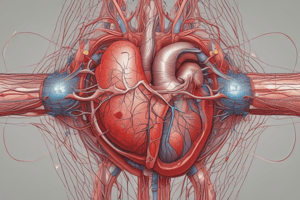Podcast
Questions and Answers
What is a common change in the skin associated with normative aging?
What is a common change in the skin associated with normative aging?
What physical change may contribute to a decrease in independence in older adults?
What physical change may contribute to a decrease in independence in older adults?
Which of the following sensory changes is commonly experienced by older adults?
Which of the following sensory changes is commonly experienced by older adults?
What psychological impact might arise from normative age-related changes in appearance?
What psychological impact might arise from normative age-related changes in appearance?
Signup and view all the answers
Which statement accurately reflects changes in friendships across different life stages?
Which statement accurately reflects changes in friendships across different life stages?
Signup and view all the answers
What mobility change is associated with aging?
What mobility change is associated with aging?
Signup and view all the answers
What is a common psychological effect of vision changes in older adults?
What is a common psychological effect of vision changes in older adults?
Signup and view all the answers
What does presbycusis refer to in the context of aging?
What does presbycusis refer to in the context of aging?
Signup and view all the answers
Which change is frequently associated with body build in midlife?
Which change is frequently associated with body build in midlife?
Signup and view all the answers
Which of the following is a common psychological implication of cosmetic changes made in response to aging?
Which of the following is a common psychological implication of cosmetic changes made in response to aging?
Signup and view all the answers
Study Notes
Physical Changes and Psychological Implications
-
Normative age-related changes include:
- Wrinkles
- Grey hair
- Weaker voice
-
These changes can impact self-concept and reflect cultural views on aging.
- May lead to cosmetic changes/procedures.
Changes in Body Build
- Midlife: Decrease in height
- Late life: Weight loss
Changes in Mobility
- Muscle mass and strength decrease with age.
- Increased risk of falls.
- Joint changes can be associated with depression and reduced independence.
Sensory Changes
-
Vision
- Reductions in light passing through the eye.
- Requires more illumination/light for tasks like reading.
- Presbyopia: Difficulty seeing close objects clearly.
-
Hearing
- Hearing loss and lower ability to hear high-pitched tones (presbycusis).
-
Other
- Dizziness and vertigo become more common.
-
Vision changes can significantly impact daily life (e.g., watching TV, reading a book) and may lead to decreasing social contact due to difficulties noticing fine facial details.
Friendships
-
Major life transitions (e.g., university, getting married) can lead to:
- Fewer friends
- Loss of existing friendships
-
Young adults tend to have more friends and acquaintances than other life stages.
-
Older adults tend to have fewer friendships than other life stages.
Studying That Suits You
Use AI to generate personalized quizzes and flashcards to suit your learning preferences.
Related Documents
Description
This quiz explores the normative age-related physical changes and their psychological implications. It discusses shifts in body build, mobility, and sensory perception with aging, highlighting their effects on self-concept and daily life. Test your understanding of how these changes influence emotional well-being and societal attitudes toward aging.




